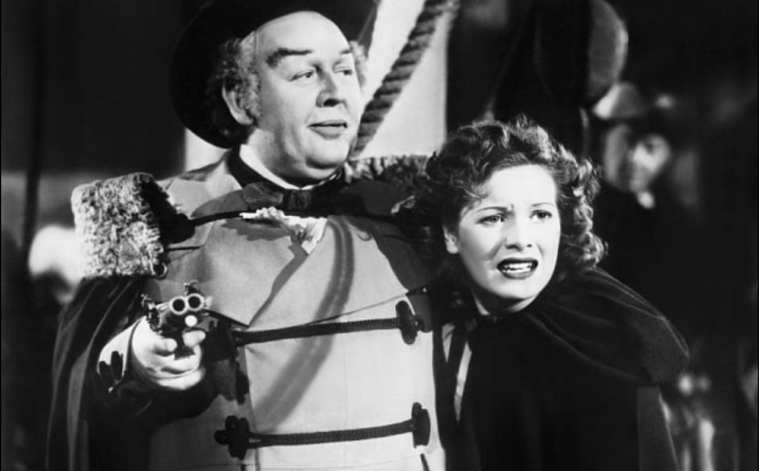
Maureen O’Hara is terrified of Charles Laughton’s eyebrows. Image: IMDb
Have you ever worked on a project that didn’t Pan Out?
Perhaps there were politics or other constraints that prevented you from doing what might have been Best for the project.
Well, nobody has a flawless record. Look at Alfred Hitchcock. His last pre-WWII, Made-In-England film, Jamaica Inn (1939), would prove to be one of his career disappointments. “Although it became a box-office hit, I’m still unhappy over it,” he said in a 1962 interview.¹
The film is, in our opinion, a bit of a Mess. It’s patchy and feels too long, even at 98 minutes.
Also: You have to squint hard to see Hitchcock’s fingerprints. He doesn’t even make his signature cameo appearance.
“By the time filming began,” writes Hitchcock biographer Patrick McGilligan, “Hitchcock felt he was in the clutches of a two-headed monster. It would be too strong to say he ceased to care, but he knew a futile struggle when he saw one, and he stepped back and let [producer] Erich Pommer and [star] Charles Laughton dominate.”²
It helps to not have High Expectations of this film going in. Yet, it’s still a testament to the power of a gripping story – in this case, the 1936 novel by Daphne du Maurier.
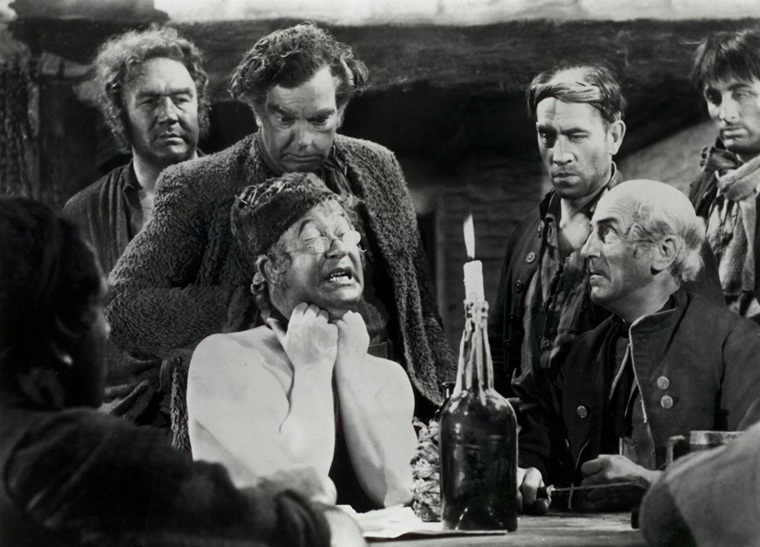
Don’t mess with the boss. Image: IMDb
Jamaica Inn is ghastly business. When a young woman (Maureen O’Hara) travels to Cornwall to live with her aunt, she discovers her uncle is the 1820’s version of a mobster.
Her uncle (Leslie Banks) and aunt (Marie Ney) operate an inn with shady characters Lurking About – specifically, a gang who cause shipwrecks for pillaging purposes. It’s organized crime, really, because Loot is counted and catalogued once it’s brought ashore. This is to ensure the thieves aren’t, you know, stealing.
If a thief is suspected of such, he is immediately strung up, and Let that be a Lesson to the Rest Of You.
Early in the film, we find Charles Laughton’s character to be suspect. He drops names, spends lavishly, and oozes slimy charm. Laughton, who, in this role, sports the strangest eyebrows on film, Chews The Scenery as best he can, and it is fabulous.
There is dark humour here and a few Hitchcockian trademarks, such as the suspicious woman (O’Hara) who ain’t easily bullied. In one scene, she hides in a cave with a fugitive thief (Robert Newton), and she has plenty o’ sass for any situation, fraught with Peril or no.
Newton: Trust me to land myself with a woman. On the other hand, of course, you did save my life.
O’Hara: I hope you make better use of it in the future.
Newton: That’s a tall order for a disparate character like me.
O’Hara: No doubt.
See that nerve? She doesn’t Skip A Beat.
A scene like that makes us a little melancholy, because it suggests this film could have been one of Hitchcock’s greats.
Novelist Daphne du Maurier was 29 years old when she wrote Jamaica Inn, inspired, apparently, by a vacation at the actual inn. When the novel was released, she was married with a young child; however, she was not someone who squeezed in writing between jobs to feed her family. She came from Money.
According to her official website, “For a long time Daphne du Maurier was described as a romantic novelist. This is completely misleading as she wrote dark, often gothic and edgy novels and short stories, with unexpected twists or suspenseful endings.”³
She had been labelled reclusive, but there are many stories of her generosity. For example, British author Julie Myerson describes her own experience:
Back in 1974, I wrote Daphne a fan letter… Amazingly, she replied. Her address was printed on the reverse of the envelope, so how could I not write straight back? We corresponded for a couple of years, and that changed my life, making a Nottingham schoolgirl’s idea of growing up to be an author seem an actual possibility, rather than just a dream.4
Jamaica Inn has been adapted for stage, radio, and television, proving du Maurier’s story holds meaning for any generation – something Alfred Hitchcock undoubtedly knew.
Notes
Jamaica Inn: starring Charles Laughton, Leslie Banks, Maureen O’Hara. Directed by Alfred Hitchcock. Written by Sidney Gilliat and Joan Harrison. Mayflower Pictures Corporation, 1939, B&W, 98 mins.
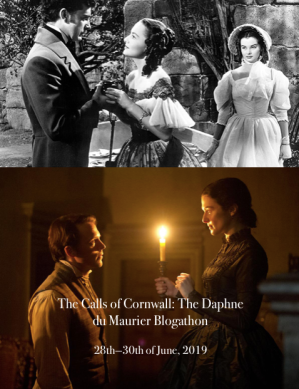


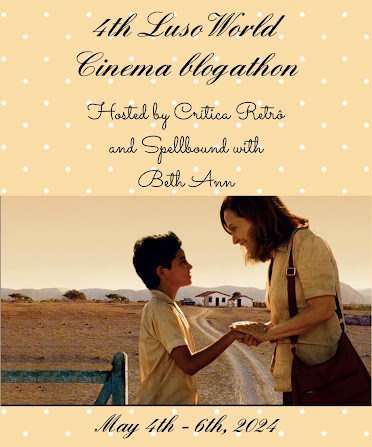

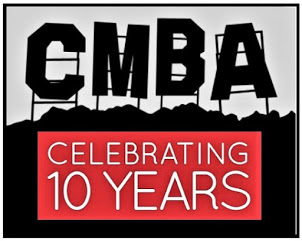


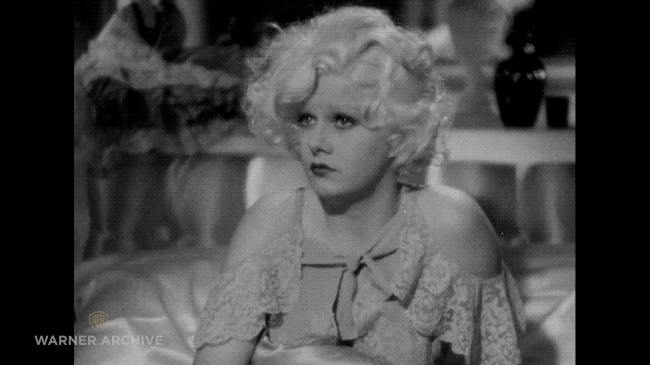


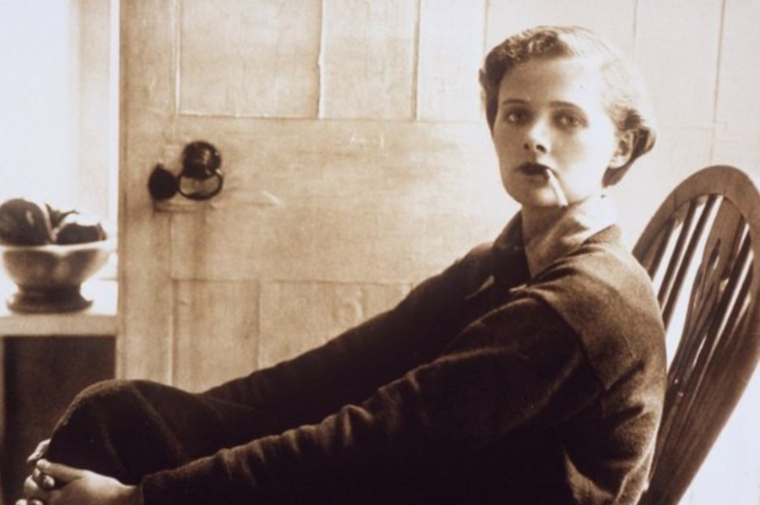


Hitchcock made 2 war propaganda shorts in England in 1944. And returned to England in early 1970’s to make FRENZY.On dvd there is an extra about his return.
LikeLiked by 2 people
Oh right – I forgot about that. Will make that correction. Thanks!
LikeLike
I completely agree with your assessment that it’s a mess! I loved the book and, unfortunately, I thought this film did it no credit whatsoever. Great review and I loved the bit of du Maurier backstory.
LikeLiked by 1 person
I’m going to look for a du Maurier biography. She sounds interesting in a non-flashy way.
LikeLiked by 1 person
Wow I haven’t seen this film, despite taking a Hitchcock class in college! Sounds like a bit of a mess indeed. I do really love the story about a fan letter turning into a pen pal for a few years. What a sweet story! 🙂
LikeLiked by 1 person
I love that story, too. It shows what a difference a bit of mentoring/coaching can do in a person’s life.
As for the film, it’s almost worth watching for Charles Laughton’s over-the-top performance.
LikeLiked by 1 person
I’ve never seen this one, either, even though I’m also a huge Hitchcock fan. Too bad it’s a mess. I guess there was a reason Hitch didn’t make a cameo. 🙂
That story about the author is awesome! 🙂
LikeLiked by 1 person
I love that story about the author. We need more stories like it, I’ve decided.
I also think it would be interesting if you gave this film one of your “Bad Movie Review” treatments…
LikeLike
Not that it’s super bad…just that a person could have fun with it, I think.
LikeLike
Fascinating. 🙂
LikeLiked by 1 person
I wish I could whole-heartedly recommend this film, because it could’ve been fabulous. Thanks for stopping by. 🙂
LikeLiked by 1 person
It’s such a shame when that happens 🙂 It’s always a pleasure reading your posts 🙂
LikeLiked by 1 person
Thanks so much! 🙂 You just made my day.
LikeLiked by 1 person
😀
LikeLike
Hi Ruth. I never saw this one. But I like your description of Laughton. He “sports the strangest eyebrows on film.” If I notice the movie being shown on TCM, I’ll tune in to take a look at him!
Neil
LikeLiked by 1 person
Oh yes, you’ve got to see those eyebrows. Maybe they were all the rage in the 1820s, but even so.
LikeLiked by 1 person
Does Hitchcock have a cameo in this one?
LikeLiked by 1 person
Alas, no, and I can’t really blame him.
LikeLiked by 1 person
I so enjoyed reading this. It’s such a pity as you say that this was such a missed opportunity. I have heard numerous stories about Laughton’s impossible demands during the making of this film and how Hitchcock couldn’t way for it to be over. I love the original novel, and so I hold out hope that a faithful adaptation will eventually be made. Thanks so much for contributing to my Blogathon!
LikeLiked by 1 person
I quite liked the miniseries starring Jane Seymour from the 1980s, but I also wish Hitchcock had the opportunity to redo this story.
Thanks for hosting this blogathon. It’s going make me read more of her writings and watch more film adaptations – not a bad summer activity!
LikeLiked by 1 person
I haven’t seen that one. Oh yes that would have been really lovely.
Yay! That sounds like just the thing! Enjoy!
LikeLiked by 1 person
I love the book, so I was disappointed when I heard the movie was bad. But when I watched it–knowing that–I was still entertained by its campy quality. Laughton is so entertainingly weird in it, and O’Hara a good choice for Mary. It’s just not Du Maurier’s story. It reminds me of a bit of Beat the Devil, as my biggest reaction (there and here) was What IS this??
LikeLiked by 1 person
Haha! “What IS this?” is never a sign of a successful movie. But I love O’Hara’s performance – Laughton was right to insist on her – and he himself is fabulous camp, as you said.
LikeLike
I agree that it’s definitely one of Hitchcock’s lesser films. Robert Newton is never subtle, so his acting style seems contrary to the Hitchcock norm.
LikeLiked by 1 person
Ah yes, Robert Newton. He really doesn’t suit the Hitchcockian norm, now that you mention it.
LikeLike
Never saw this one, thanks for the review!
LikeLiked by 1 person
If you do watch this film, a bowl of your fab Peach Cobbler would be a nice accompaniment. 😉
LikeLiked by 1 person
I love the way you think!
LikeLiked by 1 person
Always learn so much. I always know Charles Laughton for directing one of my favourite ever films, but good to be reminded about his acting career too. I know Daniel Day Lewis was a big fan.
LikeLiked by 1 person
I didn’t realize Daniel Day Lewis was a Charles Laughton fan. Not only is he a good actor, he has excellent taste.
LikeLike
If you want to get me mad just tell me about those bad reviews Night of the Hunter got! Happy to share something for you for once 😊
LikeLiked by 1 person
Yes, you’re right!
LikeLike
I haven’t watched this film yet – one of the few Hitchcocks I missed – but of course I plan to. I just know that I shouldn’t have very high expectations. Also, nice info on Daphne’s kindness.
Kisses!
LikeLiked by 1 person
It’s nice to hear about famous authors who encourage young writers, isn’t it? I love that story.
LikeLike
Frenzy is another of Hitchcock’s made in England films. It’s a powerful film, which can be hard to watch because of its depiction of violence toward women, but it’s very well made and return to form for the suspense thriller he made famous decades before this came out.
LikeLiked by 1 person
Thanks for sharing your reactions to Frenzy. I’ve never been keen to see it, but your comment makes me think I ought to track it down.
LikeLiked by 1 person
Nice
LikeLike
Thanks!
LikeLike